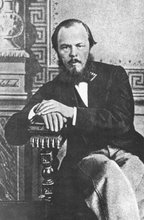 I have been thinking of Smerdyakov and of Alyosha, the two characters that move around a lot, in counterpoise with Father Ferapont, a character I think is a counterweight to the goodness and palavering all around him, who does never stray from his little hut full of flaming icons. Smerdyakov is seen here, then there, cropping up here or there without there being any apparent movement on his part: he just manifests, like a bad dream, in his patent leather or calfskin or other kinds of fancy boots. As we see in the last, or next, post, depending in which direction you are reading, Smerdyakov is liable to "do anything," on the basis of his illusion that he is party to everything, knowing even what people (that is, everyone except himself) are going to do before they do it. Alyosha, on the other hand, tries to "do everything," running breathlessly from task to task, but he knows nothing, barely remembering where he is going, or what he is to do when he gets there. Ferapont by contrast moves not at all; is simply mad. He lives "beyond the hermitage apiary" and is tended to by an anti-social beekeeping monk (166). Throughout the book, insects are referred to. Dostoevsky's name for the faithless, rational world is "anthill." Through the power of concordances (see link to your right) one can look for the words "insect" and "ant" and "bee" as much as one likes, but that strikes me as an insect-like activity; so no, I prefer to direct you to Father Zosima's conversation with the comely birdcatcher (a Mozartian figure, to be sure), wherein Zosima praises the "golden bee" and other insects: "For each blade of grass, each little bug, ant, golden bee, knows its way amazingly; being without reason, they witness the divine mystery, they ceaselessly enact it" (294-295).
I have been thinking of Smerdyakov and of Alyosha, the two characters that move around a lot, in counterpoise with Father Ferapont, a character I think is a counterweight to the goodness and palavering all around him, who does never stray from his little hut full of flaming icons. Smerdyakov is seen here, then there, cropping up here or there without there being any apparent movement on his part: he just manifests, like a bad dream, in his patent leather or calfskin or other kinds of fancy boots. As we see in the last, or next, post, depending in which direction you are reading, Smerdyakov is liable to "do anything," on the basis of his illusion that he is party to everything, knowing even what people (that is, everyone except himself) are going to do before they do it. Alyosha, on the other hand, tries to "do everything," running breathlessly from task to task, but he knows nothing, barely remembering where he is going, or what he is to do when he gets there. Ferapont by contrast moves not at all; is simply mad. He lives "beyond the hermitage apiary" and is tended to by an anti-social beekeeping monk (166). Throughout the book, insects are referred to. Dostoevsky's name for the faithless, rational world is "anthill." Through the power of concordances (see link to your right) one can look for the words "insect" and "ant" and "bee" as much as one likes, but that strikes me as an insect-like activity; so no, I prefer to direct you to Father Zosima's conversation with the comely birdcatcher (a Mozartian figure, to be sure), wherein Zosima praises the "golden bee" and other insects: "For each blade of grass, each little bug, ant, golden bee, knows its way amazingly; being without reason, they witness the divine mystery, they ceaselessly enact it" (294-295). 
We see here Smerdyakov as a fore-knower, a necromancer of sorts. As an ant-man, he makes his little pile of facts, he tunnels through them looking for good things. He is up in the attic, he is down in the cellar, he is in the dining room, the kitchen, the bedroom, the neighbor's yard with his guitar, he is waiting at the gate of Fyodor's house when Ivan comes home from the tavern, on the perilous and sinister threshold. In contrast to these spooky manifestations of Smerdyakov, we see Alyosha moving like a bee, slightly behind time, wavering and bumbling, bringing up the rear, all abuzz, but somehow time waits for him: he breathlessly arrives at Father Zosima's in the evening, full of reproaches for himself for having spent the entire day running around in his extraordinarily disorganized way (where does he go? "First to his father's" (172), then an encounter with the schoolboys, then to the Khokhlakov's, to the miserable cottage on Lake Street, then back to the Khokhlakov's, then over the wall to Dmitri's gazebo, and over the wall again out to the tavern to intercept Ivan, who is hanging out the window (no thresholds for these boys), then finally back to Father Zosima's, never finding Dmitri, at all, who was as he set out his first and principle goal), and then he is astonished to find Zosima, not dying, but cheerfully conversing. Alyosha is just is all over, panting and dizzy with the effort. Had he found Dmitri, there would have been an alibi, perhaps. And where was Dimitri?
Photo credits: 1) 14th c. manuscript illustration to Ibn Butlan's popular health manual, "Taccuinum Sanitatis." Image from Wikipedia Commons, on beekeeping. 2) Poster for performance of Mozart's "Magic Flute," the story of a comely birdcatcher, at Algoma Conservatory of Music, Sault Ste Marie, Ontario.
